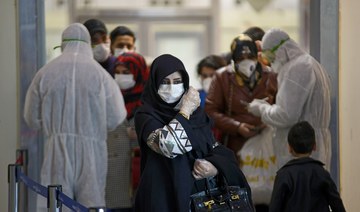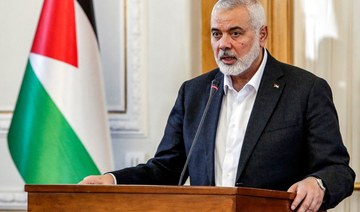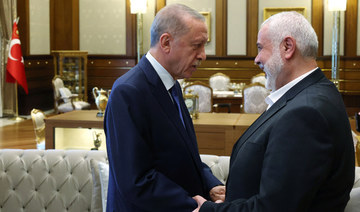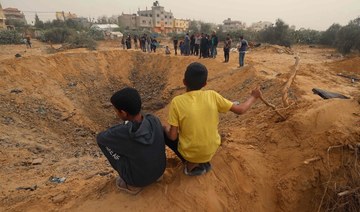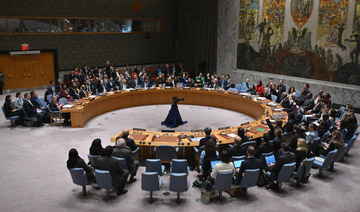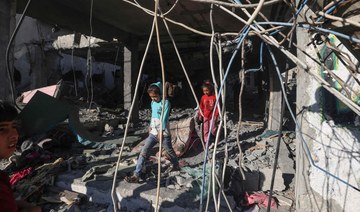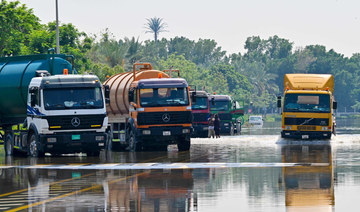BAGHDAD: On an abandoned sidewalk in Baghdad, under strict government curfew to contain the novel coronavirus, a handful of volunteers with masks and gloves make food packages for needy families.
“What we’re doing is a humanitarian duty toward society, and anyone who can afford it should do the same,” said Abu Hashim, an Iraqi businessman in his fifties packing non-perishable goods outside a lonely storefront in the Iraqi capital’s east.
The health ministry says COVID-19 has killed 56 Iraqis and infected more than 800 others. But many suspect the real numbers to be much higher, as only a few thousand people from a population of 40 million have been tested.
In a bid to stop the spread of the novel coronavirus pandemic, authorities have imposed a countrywide lockdown, ordering schools and most shops shut.
While the government is still paying salaries and pensions to millions, Iraq’s modest private-sector economy has come to a grinding halt overnight.
Iraq is OPEC’s second-biggest oil producer, but is ranked among the 20 most corrupt countries in the world by Transparency International. The World Bank says one in five Iraqis lives under the poverty line.
Sensing that relying on authorities would be unwise, young activists, community figures and local religious leaders have come together to try to support those with no income.
Using donations to buy essentials, like lentils, beans, rice and sugar, they pack supplies in plastic bags, talk their way through checkpoints and distribute them across the city.
Mustafa Issa, a 31-year-old Iraqi Shiite Muslim who helps distribute food to more than 450 families, told AFP he felt bound by a religious duty to help.
“It’s not like when we were under embargo in the 1990s,” he said, referring to crippling international sanctions imposed on Iraq under former dictator Saddam Hussein that made even basic foodstuffs unavailable.
“Baghdad is full of food right now, but people can’t buy it. One construction worker we support has a family of eight, and suddenly has no income. Another man had sold his cooking gas canister to buy food. A third sold his phone,” he said.
In a society that deeply values abundance and generosity, particularly at the dinner table, some are too proud to admit they need help.
“One woman walked halfway across the city to ask for help at another mosque so no one from her own neighborhood would recognize her,” Issa said.
One government official told AFP that almost half the population could be food-poor by May, adding that authorities were studying options for subsidies.
The country imports most of its staples, including rice, meat and wheat. Officials say Iraq’s $60 billion in reserves would cover more than a year of food imports, but already prime minister-designate Adnan Zurfi on Saturday expressed worry that the government might have to cut public-sector wages.
Issa was not taking any chances.
“We don’t know when this crisis will end. It could go on until July. Some of us are storing goods for later,” he said.
“This is more dangerous than Daesh,” he added, referring to Daesh that swept through a third of Iraq in 2014.
That conflict further ravaged Iraq’s dilapidated medical infrastructure, and there are fears a spike in COVID-19 cases would overwhelm hospitals.
Iraq, which relies on oil revenues for more than 90 percent of its state budget, is also facing the lowest crude prices in more than a decade and a paralyzed political class unable to reach consensus over a new cabinet.
Some Iraqis are taking public health into their own hands.
Asaad Al-Saadi, 40, has turned his Baghdad home into a makeshift workshop, producing face masks to help prevent the transmission of COVID-19.
“I saw the pandemic was spreading quickly and the simplest ways to fight it weren’t available,” Saadi said.
He bought two sewing machines and now produces around 1,000 masks per day. They are distributed in packs of 10 to needy families.
Saadi is also considering making other kinds of protective gear for under-equipped health workers.
Such grassroots efforts have swept through the provincial capitals of the south, down to the oil-rich port city of Basra.
Some are led by Iraqi women, in a country that remains broadly conservative and where just 15 percent of working-age women are employed.
Free food, money discretely slipped to desperate Iraqis, landlords suspending rent payments — initiatives all independent of government or political directives.
Mohammad Jabboury, a farm owner in Iraq’s west organizing food distributions and urging landlords to lower rents, expressed a sense of obligation toward those less fortunate.
“It’s our duty to help those in need until God saves us from this pandemic,” he said.
Iraqis rally to help needy families as virus hits, economy falters
https://arab.news/4zman
Iraqis rally to help needy families as virus hits, economy falters
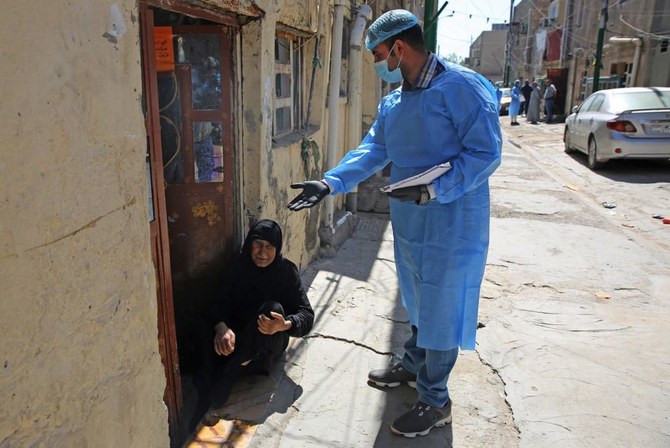
- The ministry of health reported 56 coronavirus deaths
- The World Bank says one in five Iraqis lives under the poverty line
Erdogan in mediation talks with Hamas leader amid domestic controversies
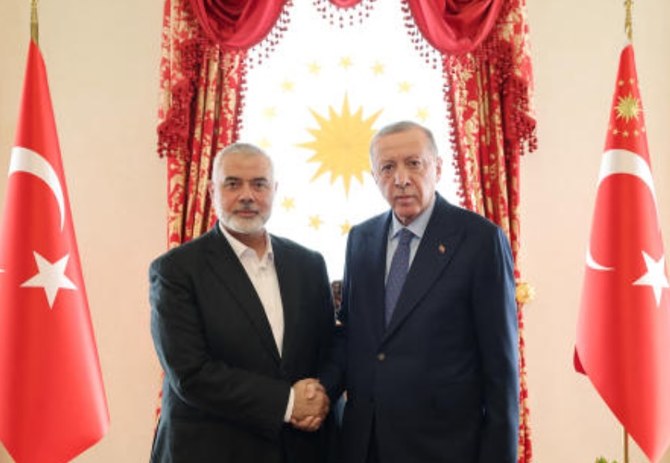
- The meeting ‘is part of president’s attempts to reposition himself as credible defender of Palestinian cause,’ analyst tells Arab News
- Turkiye does not consider Hamas a terrorist organization, unlike Washington and Brussels
ANKARA: The meeting between Turkish President Recep Tayyip Erdogan and Hamas leader Ismail Haniyeh in Istanbul on Saturday has sparked debate over Turkiye’s attempts to play a greater mediating role for the Palestinian cause amid domestic controversies over the ruling government, which has lost support among its conservative electoral base since local elections last month.
Haniyeh’s visit is his first meeting with Erdogan in Turkiye since the start of the Israeli-Hamas conflict in Gaza.
For Wolfango Piccoli, co-president of Teneo Intelligence in London, the meeting is part of Erdogan’s attempts to reposition himself as a credible defender of the Palestinian cause after his recent electoral defeat.
“Hosting the Hamas leader is likely to reinforce the impression in the West that Turkiye is at best a transactional partner, not an ally,” he said.
Turkiye does not consider Hamas a terrorist organization, unlike Washington and Brussels. The country has also strongly criticized Israel’s military operation in Gaza, which Erdogan previously described as genocide. Hamas also established a presence in Istanbul in 2011, although not on par with its political office in Doha.
Ankara has also been a major humanitarian donor to Gaza, alongside several Gulf states, and has actively helped several Palestinians from Gaza receive medical treatment in Turkish hospitals.
“I will continue to defend the Palestinian struggle and be the voice of the oppressed Palestinian people as long as Allah gives me life, even if I am left alone,” Erdogan said in his speech to parliament last Wednesday.
The Turkish president has always been on friendly terms with Haniyeh.
In a recent phone call to the Hamas leader, Erdogan offered his condolences after three of his sons were killed in an Israeli air strike in Gaza.
“Israel will definitely be held accountable before the law for the crimes against humanity it has committed,” Erdogan told Haniyeh, according to an AFP report.
For Betul Dogan Akkas, assistant professor of international relations at the department of international relations at Ankara University, given the current fragile situation in Gaza, there is a significant need for the mediation efforts by Qatar and Turkiye.
“With Haniyeh and other officials based in Qatar, there is now a more effective political bureau compared to the past. The current military balance in Gaza is very critical; they are cornered in Rafah. On the other hand, Hamas needs to build a more strategic power,” she told Arab News.
Akkas thinks that if this Saturday’s visit of Haniyeh contributes to further collaboration between Turkiye and Hamas to address that strategic power deficiency, it would be meaningful.
“Haniyeh could take on a more effective role due to Gaza’s current situation because they need a way out,” she added.
Domestically, however, Erdogan’s Justice and Development Party, known as the AKP, has come under heavy criticism for its flourishing and uninterrupted trade with Israel, even during its military offensive in Gaza.
The AKP’s Islamist rival, the New Welfare Party or YRP, played this trade card during the local elections on March 31, highlighting Erdogan’s failure to halt economic ties with Israel despite his harsh rhetoric against the Jewish state.
The YRP accused the government of applying double standards by strongly criticizing Israel while continuing trade relations. After the elections, the YRP won some local administrations previously held by the AKP.
Turkiye’s exports to Israel exceeded $5.4 billion in 2023, accounting for 2.1 percent of its total exports, according to official data.
Following nationwide criticism, the Turkish Trade Ministry recently imposed restrictions on some 54 categories of exports to Israel, including cement, steel, machinery, construction materials, chemical compounds, and several metal products, and these restrictions are expected to remain in place until Israel declares a ceasefire in Gaza.
On April 16, Erdogan compared Hamas to Turkish independence fighters who resisted foreign occupiers during the liberation of the country and the establishment of the modern Turkish Republic in 1923.
His comments were seen as one of the most blatant endorsements by the Turkish leader since the start of the war in October.
According to Piccoli, while such words may play well with domestic audiences, they are unlikely to be welcomed in Western capitals, including Washington.
Erdogan will make his first official visit to the US since the election of President Joe Biden in 2020 on 9 May. The Palestinian cause is expected to feature in the talks.
Piccoli believes that Haniyeh’s visit is unlikely to lead to any concrete Turkish action against Israel.
“The economic restrictions and Haniyeh’s visit reflect Turkiye’s desire to ensure that the Gaza conflict is not overshadowed by tensions between Israel and Iran, including the Iranian attacks of April 13-14 and the Israeli strikes on Isfahan in the early hours of April 19,” he said.
Earlier this week, Erdogan blamed Prime Minister Benjamin Netanyahu for Iran’s unprecedented attack on Israel, Piccoli added.
On the other hand, how Turkiye will be able to mediate between Palestinian and Israeli negotiators is raising concerns, especially after Erdogan’s harsh criticism of Israel’s military actions in Gaza.
The fate of the hostages held by Hamas since Oct. 7 will also be a source of concern for such mediation efforts.
Turkish Foreign Minister Hakan Fidan visited Qatar April 16-17 and met with Haniyeh and Qatari Prime Minister Sheikh Mohammed bin Abdulrahman Al -Thani.
Turkiye was to host intense diplomatic negotiations on Saturday as Egyptian Foreign Minister Sameh Shoukry was also expected to travel to the country to discuss the situation in Gaza with Fidan.
For Piccoli, while the recent negotiations may go some way to assuaging domestic public anger, the Erdogan government’s outreach to Hamas is likely to reinforce the impression in the US and the EU that Turkiye is no longer aligned with the West and is now — at best — a potential partner rather than an ally.
For the moment, Erdogan has been cautious about commenting on his meeting with Haniyeh.
“We will keep the agenda between us and Mr.Haniyeh,” he said when questioned by journalists on Friday.
Palestinians to reconsider US ties after veto of bid for full UN membership, Abbas says
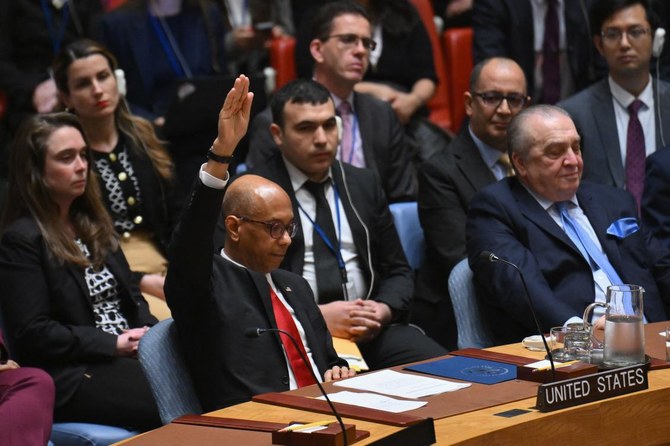
- Washington vetoed a Palestinian request for full United Nations membership
CAIRO: The Palestinian Authority will reconsider bilateral relations with the US after Washington vetoed a Palestinian request for full United Nations membership, President Mahmoud Abbas said in an interview with the official WAFA news agency.
Israel says its forces kill 10 militants in West Bank raid

- “Security forces eliminated 10 terrorists during encounters” over more than 40 hours, the army said
- Eight soldiers and a police officer had been injured in the raid
TULKARM, Palestinian Territories: The Israeli army said Saturday that its security forces killed 10 militants in an ongoing raid around Nur Shams, a refugee camp in the north of the occupied West Bank.
“Security forces eliminated 10 terrorists during encounters” over more than 40 hours, the army said in a statement.
The army said eight soldiers and a police officer had been injured in the raid.
An AFP journalist in nearby Tulkarem heard gunshots and blasts coming from Nur Shams on Saturday.
Residents contacted by AFP said there was a power outage and food was running short in the camp, saying nobody was allowed to enter or leave.
Since early last year violence has flared across the West Bank, which Israel has occupied since 1967. The violence has further escalated since the war in Gaza broke out on October 7.
Israeli forces say their frequent raids in the West Bank target Palestinian militants, but civilians are often among the dead.
Around 480 Palestinians have been killed by Israeli troops or settlers in the West Bank since the Hamas assault on Israel triggered the Gaza war, according to Palestinian official sources.
Emirates and flydubai resume normal operations after Dubai floods
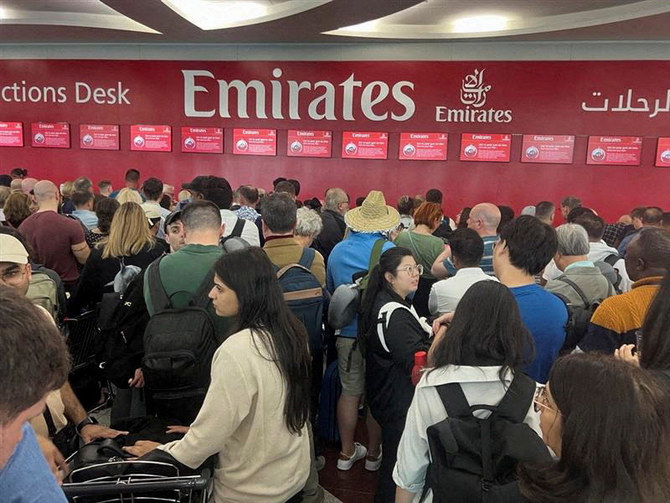
- Emirates canceled nearly 400 flights and delayed many more as a result of a record storm that hit the desert city of Dubai
RIYADH: Dubai’s flagship carrier Emirates and sister airline flydubai have restored normal operations after heavy rains caused severe flooding across the United Arab Emirates earlier this week, the airlines said on Saturday.
Emirates canceled nearly 400 flights and delayed many more as a result of a record storm that hit the desert city of Dubai on Tuesday, said a statement released by the airline’s president, Tim Clark.
Due to the impact of the storm, the airline suspended check-in for passengers departing from Dubai and halted its transit operations through Dubai International Airport, a major global travel hub, leaving thousands of travelers stranded.
The airport has struggled to return to normal operations after the storm flooded taxiways, forcing flight diversions, delays and cancelations.
Flydubai also returned to its full flight schedule from the airport’s Terminal 2 and Terminal 3 on Saturday following the weather-related disruption, a spokesperson for the airline said.
Clark said Emirates had provided 12,000 hotel rooms and 250,000 meal vouchers to customers who were affected. He added it would take days to clear the backlog of rebooked passengers.
The UAE has suffered the impact of the flooding for days, with roads between the city and Abu Dhabi still partially under water as of Saturday. In Abu Dhabi, some supermarkets and restaurants faced product shortages, unable to receive deliveries from Dubai.
Researchers have linked extreme weather events such as Tuesday’s storm to climate change and anticipate that global warming will lead to higher temperatures, increased humidity and a greater risk of flooding in parts of the Gulf region.
A lack of drainage infrastructure to cope with heavy rains in countries such as the UAE can put them at particular risk of flooding.
Israeli airstrike in Rafah kills at least 9 Palestinians, including 6 children
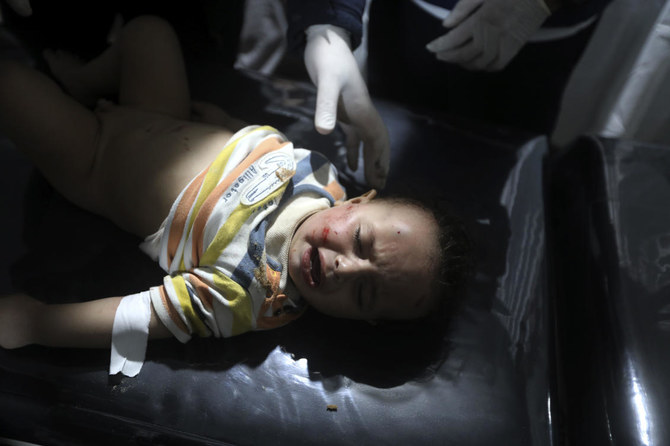
- Strike late Friday hit a residential building in the western Tel Sultan neighborhood of the city of Rafah
RAFAH, Gaza Strip: An Israeli airstrike on a house in Gaza’s southernmost city killed at least nine people, six of them children, hospital authorities said Saturday, as Israel pursued its nearly seven-month offensive in the besieged Palestinian territory.
Israel’s war against the Islamic militant group Hamas has led to a dramatic escalation of tensions in an already volatile Middle East.
The strike late Friday hit a residential building in the western Tel Sultan neighborhood of the city of Rafah, according to Gaza’s civil defense. The bodies of the six children, two women and a man were taken to Rafah’s Abu Yousef Al-Najjar hospital, the hospital’s records showed.
At the hospital, relatives cried and hugged the bodies of the children, wrapped in white shrouds, as others comforted them.
The fatalities included Abdel-Fattah Sobhi Radwan, his wife Najlaa Ahmed Aweidah and their three children, his brother-in-law Ahmed Barhoum said. Barhoum also lost his wife, Rawan Radwan, and their 5-year-old daughter Alaa.
“This is a world devoid of all human values and morals,” Barhoum told The Associated Press Saturday morning, crying as he cradled and gently rocked the body of Alaa in his arms. “They bombed a house full of displaced people, women and children. There were no martyrs but women and children.”
No victims were registered from a second overnight strike in the city.
Rafah, which lies on the border with Egypt, currently hosts more than half of Gaza’s total population of about 2.3 million people, the vast majority of whom have been displaced by fighting further north in the territory.
Despite calls for restraint from the international community, including Israel’s staunchest ally, the United States, the Israeli government has insisted for months that it intends to push a ground offensive into the city, where it says many of the remaining Hamas militants are holed up.
Such a ground operation has not materialized so far, but the Israeli military has repeatedly carried out airstrikes on and around the city.
The war was sparked by an unprecedented raid into southern Israel by Hamas and other militant groups on Oct. 7 that left about 1,200 people dead, the vast majority of them civilians, and saw about 250 people kidnapped and taken into Gaza. Israel says about 130 hostages remain in Gaza, although more than 30 have been confirmed to now be dead, either killed on Oct. 7 or having died in captivity.
The Gaza Health Ministry said Saturday the bodies of 37 people killed by Israeli strikes were brought to hospitals in Gaza over the past 24 hours. Hospitals also received 68 wounded, it said. The latest figures bring the overall Palestinian death toll from the Israel-Hamas war to at least 34,049, and the number of wounded to 76,901, the ministry said. Although the Hamas-run health authorities do not differentiate between combatants and civilians in their count, they say at least two thirds have been children and women.
The war has sent regional tensions spiraling, leading to a dramatic eruption of violence between Israel and its archenemy Iran that threatened to escalate into a full-blown war.
On Friday, both Iran and Israel played down an apparent Israeli airstrike near a major air base and nuclear site in central Iran, indicating the two sides were pulling back from what could have become an all-out conflict. Over the past several weeks, an alleged Israeli strike killed two Iranian generals at an Iranian consulate in Syria and was followed by an unprecedented Iranian missile barrage on Israel.
Israel has also faced off with the Hezbollah militant group, an Iranian proxy operating from Lebanon, with the two sides there frequently trading rocket and drone attacks across the Lebanese-Israeli border. Yemen’s Iran-backed Houthi rebels have also joined the fray, launching strikes against merchant ships in the Red Sea and the Gulf of Aden in what they say is a campaign of solidarity with the Palestinians in Gaza.
Tension has also been high in the occupied West Bank, where an Israeli military raid Friday in the Nur Shams refugee camp killed at least four Palestinians, including three militants, according to the Israeli military, Palestinian health officials and a militant group.
Palestinian health authorities said one of those killed was a 15-year-old boy shot dead by Israeli fire. The Islamic Jihad militant group confirmed the deaths of three members, including one who it said was a local military commander. The Israeli military said four Israeli soldiers were slightly wounded in the operation.
Saraya Al-Quds, the military arm of Islamic Jihad, said its fighters had engaged in heavy gunbattles Saturday morning with Israeli forces in the town of Tulkarem, adjacent to Nur Shams. No further details were immediately available. Residents in Tulkarem went went on a general strike Saturday to protest the attack on Nur Shams, with shops, restaurants and government offices all closed.
Since the Oct. 7 Hamas attack on southern Israel, more than 460 Palestinians have been killed by Israeli fire in the West Bank, Palestinian health officials say. Israel stages frequent raids into towns and cities in the volatile territory. The dead have included militants, but also stone-throwers and bystanders. Some have also been killed in attacks by Israeli settlers.



